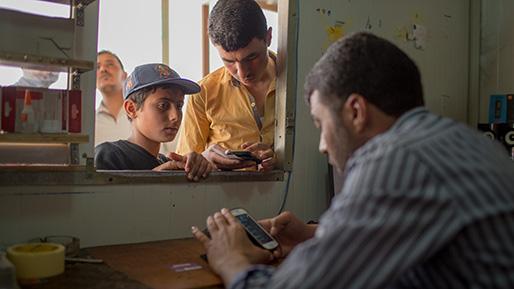As one of the world’s largest aid donors, the EU’s Civil Protection and Humanitarian Aid Operations department helps coordinate and support sector-wide initiatives to develop norms and standards around digitalisation.
As an emergency management organisation, it has supported deploying new technologies to improve the cost-effectiveness of humanitarian interventions and focus aid on where the needs are greatest.
Cash-based assistance has been an entry point for digitalisation in the humanitarian sphere. Cash can now be delivered securely, often based on biometric data. This is done through various systems such as financial service providers and mobile phones, thus ensuring that humanitarian aid directly reaches people in need on time.
To respond to the challenges posed by COVID-19, EU partners involved in education projects employed new technologies. For example, they have found creative ways to engage with the children using messaging and distance learning modalities.
When disasters strike, the EU’s Emergency Management Service Copernicus provides satellite imagery and open data sources. This helps all actors involved in the response to emergency situations and humanitarian crises.
At the same time, the EU recognises that digital technologies give rise to a number of ethical challenges. Ultimately, the use of digital technologies in humanitarian operations should be people-centred and rooted in the humanitarian principles of humanity, neutrality, impartiality, and independence.
As part of the effort to address the challenges of data protection, data ethics and data sharing, the European Commission supports the work of the United Nations Office for the Coordination of Humanitarian Affairs (OCHA) Centre for Humanitarian Data.
In particular, to draft general guidelines on how to manage sensitive data for the humanitarian sector. In addition, to develop a secure infrastructure that will allow humanitarian partners to process sensitive data responsibly.
EU priorities linked to the adoption of digital technologies for humanitarian assistance include:
- Data protection and data ethics: the humanitarian sector must share a common understanding of data ethics and work together on the development of data protection standards
- Strengthening collaboration: enhancing digitalisation in the humanitarian sector requires greater data sharing in line with data protection standards, system and database interoperability, and sharing lessons learnt on best (and worst) practices.
- Focusing on impact and efficiency: digital technologies are showing positive effects where they are applied as part of the solution to a clearly defined humanitarian problem. The EU encourages its partners to use innovative digital solutions where these can improve the effectiveness and efficiency of humanitarian response.
To maximise the benefits of digitalisation for humanitarian aid, the EU supports digital approaches and, or solutions built into the design and implementation of humanitarian actions.
The Commission’s department of Civil Protection and Humanitarian Aid Operations leads the way by gathering the necessary technical expertise and liaising with other EU services to build synergies and boost effectiveness.
Last updated: 27/02/2024



